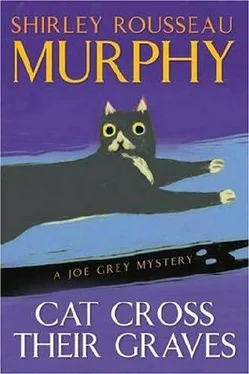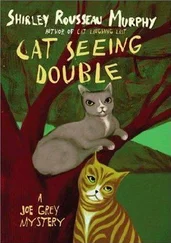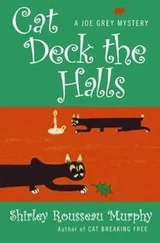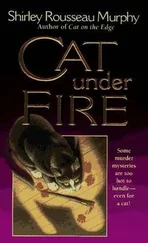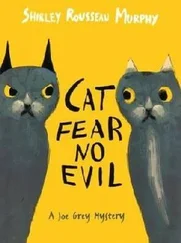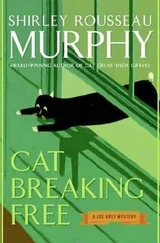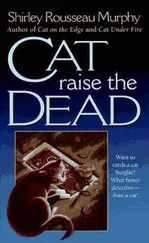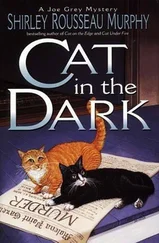There were a couple more questions, the chief discussed half a dozen more situations, and the officers filed out, heading for their units. Joe imagined them settling into the cold, black leather seats of their squad cars, their holstered guns and handcuffs and all the equipment they must wear pressing into their butts and backs, imagined them moving about into just the right worn position to get comfortable, some of them balancing coffee mugs. Imagined the late watch revving their adrenaline along with their engines, heading out on patrol not knowing whether they might have to use their handguns, might get shot tonight or have to shoot-or spend the shift bored out of their skulls.
They would be watching for Patty's killer, though. Smiling, Joe trotted on down the hall and into Max Harper's dark office, just beating Harper and Garza there. When they came in, he was curled up in the bookcase between two volumes of the California civil code. He watched Garza dump water in Harper's coffeepot and drop in a prepacked filter. He liked the scent of coffee, it spoke to him of camaraderie, easy friendship-and of ready information.
Harper, tossing the three stacks of faxes and printouts on his desk, eased into his leather chair. The chief looked tired. Garza poured their coffee and picked up a set of the printouts. From the shelf, Joe had a fine view of Harper's desk. On top the stack was the chart that Mabel had prepared.
Garza didn't glance up into the bookshelves, but the detective knew he was there. A change in Garza's body language and movement connected him to Joe almost as if he had looked straight up at the tomcat. Setting his coffee mug on the low table, he settled into the leather easy chair. And Joe settled down more comfortably among the books, thinking about the second body.
The officers were not surprised by the second grave. Nor was Joe. Nothing surprised a cop, and Joe had acquired much the same view of the world. That first grave had never really seemed like the cover-up for, say, a single accidental death. His natural tomcat cynicism, honed by close association with law enforcement, had left him expecting more bodies.
Now, with so many old, unsolved cases concentrated all in one area of the Northwest, his imagination had already jumped ahead to what he imagined Hyden and Anderson might yet find, and he shivered.
Though that preconception was not always wise police work, it was the way the tomcat operated; so far, it had worked for him. He looked around the office, waiting for Harper to flip through a stack of unrelated papers that had been left on his desk, checking for anything urgent, before he got down to the subject at hand. Joe liked Harper's new office, he liked seeing the chief in a more comfortable environment. With the building's renovation, the old, open squad room with its tangle of desks and noise and constant hustle was no more. The chief had had only a scarred old desk at the back of the busy, forty-by-forty-foot space, a habitat as spartan as that of a prison guard's.
Now Harper and his two detectives had private offices, and all the officers had much-improved facilities. A more efficient report-writing room, an updated firing range in the basement, a larger and better-appointed coffee room. And thanks to Charlie, Harper's own office was a welcome retreat, with its brown leather couch and matching chair and an oriental rug, all of which had been wedding presents from Charlie, items not considered essential by those city officials who spent the taxpayers' money- though some of them hadn't stinted on their own offices.
But the city had sprung for a new walnut desk for Max, and walnut bookcases, as well, unwittingly providing a convenient though unofficial satellite office, as it were, for certain feline operatives.
Charlie's framed drawings of Max's buckskin gelding hung on the pale walls, lending a handsome finishing touch to the room. Joe was sure that, if not for Charlie's influence, Max would have moved into his new digs with the old battered desk that looked like some World War II government reject, the government-issue, service-grade vinyl-tile floor, and his dented and mismatched file cabinets. Max would likely have brought in a couple of hard chairs for visitors, and been perfectly happy with bare walls to look at-if the chief ever had time to simply look at the walls.
Below him, Max studied the faxes. "This one in Half Moon Bay is the only one in California."
"Sure doesn't fall in with the rest," Garza said. "Newer, too. Two years."
Juana Davis came in, poured herself a cup of coffee, picked up the other stack of copies from Harper's desk, and sat down on the leather couch. Placing her coffee cup on the end table, she slipped off her shoes. "Hyden and Anderson all tucked in?" Juana yawned, looking as if she meant to head for home, too, very shortly.
"When I left," Harper said, "they were still at it. They've uncovered a second body."
Davis nodded, as if she was not surprised. She looked at the chart, remarked on the Santa Cruz case, then was quiet, studying the comparisons. Joe could see Max's copy clearly, over the chief's left shoulder. Mabel had laid it out in three time periods, giving not only date and place but the barest facts as well. For Joe, this was far more legible than the computer screen where, too often, the lights bounced and reflected. From the preliminary forensics information on the new grave, some of these cases were way too old.
In two instances, twenty years ago, the suspected abductor had been a father who did not have custody and was never apprehended. Fifteen years ago, a missing Oregon child was later found, washed up from the ocean. The time frame of the other cases, where children hadn't been found, ran in three batches. The oldest three cases were children who had disappeared nearly fifty years ago. That seemed monstrous to Joe, that those cases had not been solved after half a century and, most likely, never would be. Their parents were dead and gone, their siblings growing old.
Seven cases in the Pacific Northwest had occurred between six and eight years ago. That would fit Hyden's guess on this time of death. Those children had lived in an area that ran from Tacoma to Seattle. All had disappeared from schoolyards or from playgrounds near their own schools. None had been found. "Full cases on the way?" Davis asked. Harper nodded.
In the largest group of missing children, the bodies had been found; that was some thirty years ago, again not a match. But the officers knew this case, and read with deep interest, making Joe frown. Looking for some connection? Those deaths had occurred in the L.A. area, from 1971 to 1974. All twelve children were found in 1974. Harper looked up at Davis and Garza. "You knew that Patty Rose's grandson was one of them."
The officers nodded. From the report, the bodies had been buried in the walls of a condemned and boarded-up church that was waiting to be torn down. Four men were subsequently arrested. A Kendall Border and a Craig Vernon of Norwalk, a Harold Timmons of L.A., and an Irving Fenner of Glendale. The children were between the ages of four and seven, all from the greater L.A. area.
Harper said, "Patty's daughter, the little boy's mother, was killed soon afterward in what appeared to be a one-car wreck. Car went over a cliff, up in Canada. No one could ever prove it was other than an accident." Harper had that intense, bird-dog look on his face that rang all kinds of alarms for Joe.
"Craig Vernon, the child's father, got murder one, as did Border. Both were put to death. There was not enough evidence to convict Timmons or Fenner for murder. Timmons got fifteen on circumstantial evidence, Fenner twenty-five, same charge.
"They were members of a small, pseudo-religious cult led by Fenner. They met three or four times a week, without city permission, in the condemned church. Over the years, Patty told me quite a bit.
Читать дальше
